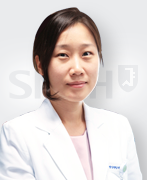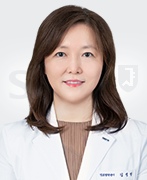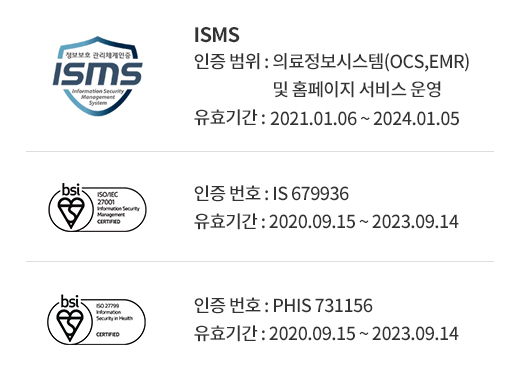Neuropsychiatry
Introduction to the Department
The Neuropsychiatry Department is providing specialized diagnosis and treatment services for areas such as mood disorder, senile mental disorder, sleep disorder, female mental health, children & juvenile mental disorder, and psychotic disorders.
An open ward with 25 beds and a day ward with 10 beds and 14 outpatient rooms are being operated. A closed ward with 15 beds will be opened in 2014. The tests that are currently available include a clinical psychological test, a computerized neurocognitive function test, polysomnography, and a chronobiological test. Individualized treatment strategies, including bio-feedback, repeated head and neck self-stimulation, light treatment, and cognitive rehabilitation treatment, are provided.
The Neuropsychiatry Department of Seoul National University Bundang Hospital is composed of five major clinics (Mood Disorder Clinic, Geriatric Psychiatry Clinic, Sleep Disorder and Stress Clinic, Child and Adolescent Psychiatric Clinic, and Early Psychosis Clinic). Each clinic provides specialized and comprehensive evaluation and cutting-edge treatment services combining medical, social, and psychological models by respecting the demands of the patients and through organic role division among treatment teams.
Mood Disorder Clinic and Clinical Affective Neuroscience Laboratory
Mood disorders, including depression and bipolar disorder, are among the major causes of disability and functional impairment around the world. Our team provides multidisciplinary evaluation and individualized treatment for patients with mood disorders. The clinical-care settings cover inpatient units, outpatient clinics, and a day hospital. Our team of experts is actively engaged in diverse research activities on the pathophysiology of mood disorders, including phenomenological studies on the clinical characteristics of mood disorders, neuroimaging studies on the brain structure and functions, physiologic studies on the biological markers, neurocognitive studies on the higher cortical functions, and clinical trials of novel therapeutics. We are currently running the Bipolar Disorder Translational Research Center and the Depression-Suicide Translational Research Center funded by the Ministry of Health and Welfare of South Korea. We are also collaborating with many international organizations and research teams to develop cutting-edge technologies for the diagnosis and treatment of mood disorders.
Geriatric Psychiatry Clinic
Dementia and Other Cognitive Disorders
We provide accurate and standardized diagnosis of dementia and other cognitive disorders as early as possible so that we can help the patients and their family members effectively cope with such disorders. We also provide cognitive rehabilitation programs and family education to maximize the function of the patients and to minimize the burden of their family members. We are leading the clinical research on dementia and other cognitive disorders worldwide as well as in South Korea by conducting pivotal research projects such as the Korean Longitudinal Study on Cognitive Aging and Dementia (KLOSCAD). We also contribute to the development of services, systems, and laws for dementia in South Korea by leading the National Institute of Dementia.
Late life depression
We provide structured diagnosis of late-life depression and its associated disorders as well as comprehensive and tailored management for them, including pharmacotherapy, psychotherapy, TMS, ECT, and light therapy. In particular, we provide the best level of medical services for subsyndromal depression, which is the most prevalent type of late-life depression. Our research is also focused on the diagnostic and prognostic markers, treatments, and impacts on the dementia risk of late-life depression.
Sleep Disorder and Stress Clinic
Sleep Disorder Clinic
The purpose of this clinic is to diagnose and treat sleep disorders such as insomnia, sleep apnea syndrome, restless-legs syndrome, narcolepsy, and REM sleep behavior disorder. In diagnosing patients with sleep disorders, we use not only the standardized polysomnography but also neuropsychological tests and various serological examinations. Continuous positive airway pressure, medications, and biofeedback with cognitive behavioral therapy are mainly administered in managing sleep disorder patients. This clinic is a part of the Sleep Disorder Center of Seoul National University Bundang Hospital, which consists of the neurology, otorhinolaryngology, psychiatry, pulmonology, and dentistry departments. The Sleep Disorder Center will lead sleep medicine in South Korea in terms of giving high-quality care to sleep disorder patients and performing researches with novelty.
Stress Clinic
The Stress Clinic helps patients with stress-related conditions such as insomnia, panic and anxiety disorders, and tension headache, and those with medical conditions affected by psychological factors. Biofeedback and neurofeedback are basic tools in the clinic, and we also use cognitive-behavioral therapy customized for the patients’ conditions. As stresses are increasing in nearly all areas of our lives, and as such stresses need to be adequately managed, this clinic is expected to play an essential role in improving mental and physical health.
Child and Adolescent Psychiatry Clinic
The Child and Adolescent Psychiatry Clinic provides comprehensive evaluation and treatment for a variety of diseases, including autism spectrum disorder (ASD), attention deficit hyperactivity disorder (ADHD), pediatric mood disorders such as depression and bipolar disorder, anxiety disorders, learning disorders, and tic/Tourette disorder. The Neuroscience Center is running the Autism and Developmental Disorder Center, which focuses on the evaluation and intervention for ASD. We offer the Parent-assisted Social Skills Training Program for teens with ASD (PEERS®), composed of 14 weekly sessions. The PEERS® intervention was originally developed in the University of California, Los Angeles, and has been successfully implemented in our clinic through the cultural adaptation of the treatment manual followed by a randomized controlled trial for Korean adolescents with ASD. The recruitment for PEERS® intervention is open all year round.
Our clinic is trying to integrate the clinical experience and further understanding of the problems of children and families through various research activities. Currently, we are focusing on behavioral genetic studies of ASD, a treatment predictor study on PEERS® intervention, and expansion of the treatment modalities of ASD using the bionics technique with the collaboration of Korea Institute of Science and Technology (KIST).
Early Psychosis Clinic
Early Psychosis Clinic provides an evaluation and consultation service for individuals who are suffering from the early signs of psychosis or who are at risk for developing psychosis. Psychotic disorders such as schizophrenia and schizoaffective disorder are among the most debilitating psychiatric disorders. Clinicians and researchers are exerting efforts to ameliorate psychotic symptoms. The prevention of the transition to psychosis is considered as important as the treatment of psychotic disorder. Thus, our clinic evaluates the individuals at risk for psychosis and provides cutting-edge treatment for them to prevent psychosis development. The clinic is also an active research site that is currently investigating the antipsychotic effect on the conversion to psychosis.






.png
)



.png
)
.png
)






